Body Recomposition Calculator
Discover the perfect calorie and macro amounts for body recomp with our customizable calculator.
What is body recomposition?
Body recomposition is the process of improving your body composition by increasing muscle mass and decreasing fat simultaneously.
Favorable body composition has many health benefits and improves athletic performance.
There is ample research-backed evidence showing it is entirely achievable. However, it requires a commitment to weight training and a nutrition plan.
How to do a body recomposition
Step 1: Enter your details into the calculator
If you know your body fat percentage (calculate here), choose Lean Mass Formula and input your percentage.
The lean mass method yields better results than weight and height alone.
Step 2: Choose your recomposition goal
- If you choose More Fat Loss, there will be less muscle gain.
- If you choose More Muscle Gain, there will be more muscle gain, but probably some fat gain.
- If you choose Even – it’s a compromise between the two.
Step 3: Take note of your calories and macros
The calculator will recommend your daily calorie and macro amounts. If you’re new to macros, you’ll need to get up to speed.
You will be told how much carb, protein, and fat you must eat daily. You can adjust this to show per meal to help you get an idea.
It’s best to eat more on workout days (the increased carbs fuel your workouts) and less on non-workout days. Protein remains relatively constant throughout – muscle recovery can happen anytime.
Step 4: Stick to a consistent workout routine.
Consistent workouts are not optional for body recomposition.
Your workouts must be resistance-based, not cardio-based. Do weight-bearing exercises rather than running or walking.
As a basis, we recommend this:
- Have three weight training sessions per week.
- Minimum of 30 minutes per session.
- Focus on compound movements.
For example, squats, deadlifts, pull-ups (or lat pull-downs) – rather than bicep curls, etc. - Rest only 30-60 seconds between sets (i.e., leave your phone at home).
- Three sets per exercise, 8-15 reps per set.
Step 5: Track your macros
For the maximum chance of success, you will want to track your macros.
This can be tricky.
If you’ve got the budget, use Factor Meals, which has consistent 500-550 calorie meals. These can form the basis of daily meals, and you can then add in protein shakes to meet the required calorie amount.
Step 6: Get enough sleep
It might seem odd, but let’s quote the research:
Sleep deprivation […] seems to create an “anti” body recomposition environment, where building muscle mass and losing FM [fat mass] would be less likely.
Step 7: Measure results
Rather than using basic scales, use an advanced scale system like Renpho. This gives far more precise body recomp metrics.
How long does it take to recompose your body?
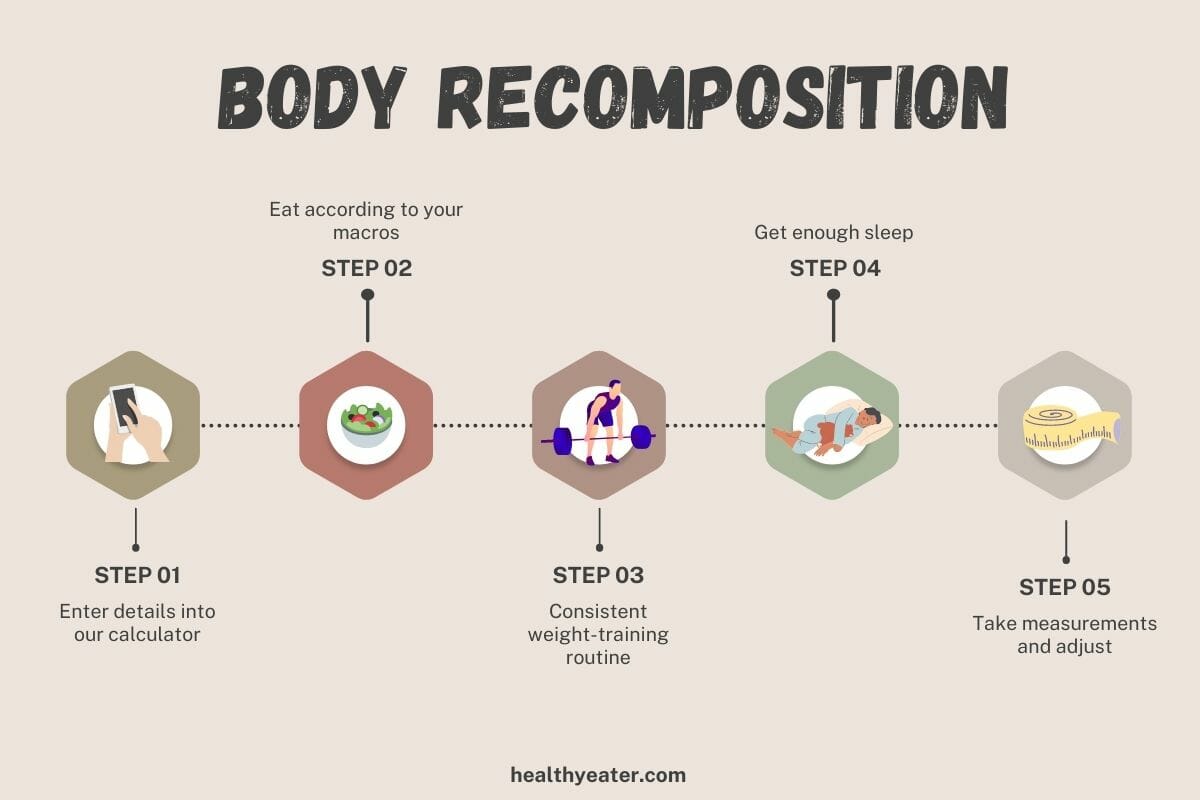
We recommend a minimum of 8 weeks.
Take measurements (fat skinfold tests, photos, etc.) weekly. You can weigh yourself – but that won’t tell you anything about your body composition.
Depending on your results, you will want to adjust your settings.
If you need help, Coach Ted has helped hundreds achieve their goals.
How much protein should I choose?
- The default option (high) is best.
- Maximum is only for those doing longer, more intense weight-lifting workouts.
- Plant-based protein is set lower: It’s challenging to meet the protein macro without carbs and fats getting too high. If you are vegetarian or vegan and okay with 1-2 protein shakes daily, use the default option.
If I do extra workouts, do I need to account for the calories?
You can account for the extra calories if you do over three weight training sessions a week.
- Track your extra calories over a week.
- Be conservative (i.e., don’t overestimate).
- Enter them into the “Additional Weekly Calories.”
The additional energy expenditure will be allocated to the overall weekly algorithm.
If you need help, use the calorie burn calculator. Remember you are looking for extra calories expended over a week.
How many calories should I eat a day for a body recomposition?
There is no one-size-fits-all here. Calories and macros for body recomposition are highly individualized.
Your biological sex, height, weight, and activity level will predict your daily energy expenditure. By making minor adjustments to this, you can begin the process of gaining muscle while losing fat mass.
The technical bits – how to calculate calories for body recomp
- Apply the Mifflin-St Jeor equation to calculate your basal metabolic rate.
- If you know your body fat percentage, use the Katch-Mcardle formula.
- Multiply BMR by 1.2 to get your maintenance calories.
- Adjust the calorie amount for training days based on the goal:
+20 % for more muscle gain and +10% for more fat loss. - Adjust calorie amount for rest days based on the goal:
-5% for more muscle gain, -15% for more fat loss. - Calculate protein amount
The default is 0.95 grams protein/lb (~2 g / kg) of body weight. Plant-based is 0.65 g/lb. - Calculate the fat amount.
Calculate fat at 30% of daily calories. - Calculate the carb amount.
All remaining calories are allocated to carbs.
Yes 🤓. That’s why we made a calculator.
Is this the same as the macro calculator?
No, there are many differences.
The standard macro calculator is aimed at people wanting to lose weight, and exercise is optional.
There are differences in both the calorie calculation step and the macro calculation step.
How much cardio for a body recomposition?
The traditional bodybuilding method involves a ‘bulk’ phase (lots of calories + heavy weights), followed by a ‘cutting’ phase (reduced calories + lots of cardio).
Body recomposition is a different process. Cardio alone (such as steady-state running or walking for 20 mins+) won’t increase muscle mass.
You should keep cardio to a minimum. However, it’s good for the heart and mental health, so don’t give up going for bike rides or walks if this is your thing.
It’s a good idea to account for the extra energy expenditure from cardio.
If you burn a lot of calories through cardio, you will not achieve the desired body recomp results. You are not doing a body recomposition!
Help! I’m not getting the desired results
- “I’m gaining some muscle but not losing fat“
Adjust calories down lower. - If your goal is Even, change it to More Fat Loss.
- Are you eating more on workout days? And less on non-workout days?
Sources
- Barakat, C., Pearson, J., Escalante, G., Campbell, B., & De Souza, E. O. (2020). Body recomposition: can trained individuals build muscle and lose fat at the same time?. Strength & Conditioning Journal, 42(5), 7-21. (full text)
- Ribeiro, A. S., Pereira, L. C., Schoenfeld, B. J., Nunes, J. P., Kassiano, W., Nabuco, H. C., ... & Cyrino, E. S. (2022). Moderate and Higher Protein Intakes Promote Superior Body Recomposition in Older Women Performing Resistance Training. Medicine and science in sports and exercise.Link
295 Comments


 Menopause Macro Calculator
Menopause Macro Calculator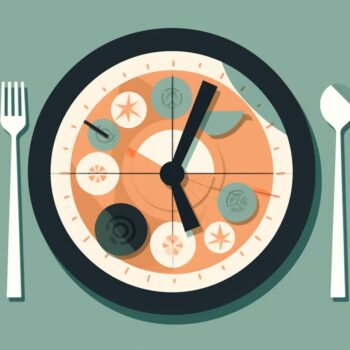 Intermittent Fasting Calculator
Intermittent Fasting Calculator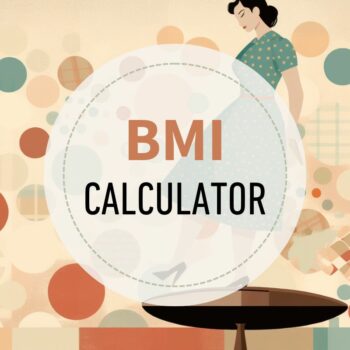 BMI Calculator
BMI Calculator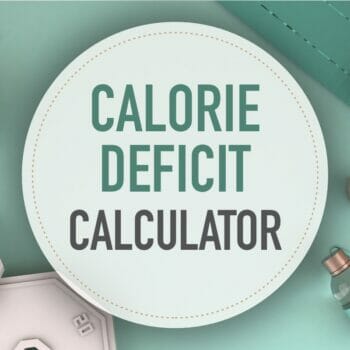 Calorie Deficit Calculator
Calorie Deficit Calculator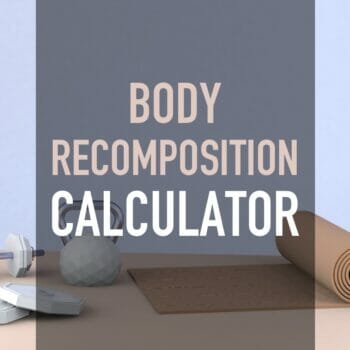 Body Recomposition Calculator
Body Recomposition Calculator
I’m currently around 21% body fat. Would you recommend me doing a regular calorie restriction for fat loss or would it be alright for me to do 8 weeks of a body recomposition for fat loss and muscle gain?
Hi Leon, I were coaching you, I’d start with a 20% deficit. This will increase the speed of fat loss while still allowing you to gain a small amount of strength.
Hello just started training its currently my third week in the gym and I work out 4 days.My current height and weight is 5’9 and 215lb also I’m 21yrs old.My maintenance seems to be 2600 so I’ve been eating at a 300 cal deficit but my goal is really to build muscle but I don’t want to gain more fat/weight.Im new to all of this should I continue doing what I’m doing or switch it up a bit?also how long does a recomp take about ?hopefully its not too long lol
Hi Chris, if you want to gain muscle but keep fat at the same level, I’d recommend eating 10% more than your maintenance to start on your training days. On your rest days eat at maintenance. Assess every two weeks.
Hi, I train 6 days per week, how much should I add to the additional weekly calories?
Hi Anwar, Head over to the exercise calculator and get an estimate for your training day calorie burn. Calories Burned Calculator
Hi, love this calculator and all of the information. I am currently in a Recomp and I am curious about the additional calories. I typically get in a good amount of steps and also warm up for 20 minutes on a lateral x machine before my intense strength sessions(usually about an hour)do I add back the calories burned on the lateral x only or some of the strength training calories as well?
Hi Jess, So glad you find everything useful. You really should establish a small deficit independent of exercise and then add the exercise calories back in for your workout days. This ensures that your muscle will have the raw materials needed to repair and strengthen.
Are the calories intended to be “net calories”, i.e. if the calculator is saying to eat 2,500 calories yet my Apple Watch tells me I burned 500 active calories during my lift and cardio, I should eat 3,000 to compensate?
By default, the calculator takes into account an average of 3 sessions a week.
So, don’t eat the extra to compensate, UNLESS you are doing additional workouts.
I’m 5 foot 4, 103 lbs and I used to be skinnyfat but now I’ve achieved some recomposition and am stronger and leaner. I’d like to improve further, but this calculator says I need less than 1600 kcal on training days and less than 1300 kcal on rest day. If I ate that my weight would absolutely plummet – I know, because I’ve tracked it. I need at least 2k calories a day just to maintain my weight, and I don’t want to get any lower, just get stronger and leaner. Perhaps I do have a fast metabolism – don’t eat junk food, and am typically warm when other people are cold. Perhaps its skewed by the fact I don’t have a car, so I do more incidental exercise than most people, though I also have a sedentary job. I’m confused.
Hi Lina, Calculators can give you an estimation but some people need more or less than the calculator recommends since there are many unique factors that can’t be accounted for. Since you know your maintenance amount you can then start by adding 100 additional calories to your training days. Cap your protein at 150 grams. Evaluate after two weeks.
Thanks I will. I can’t imagine how people survive on 1300 kcal. I’d die!
Hi Ted, this is a great site thank you! Your calculator and advice is helpful, as I’m trying to make some changes. I’m thinking I’ve been eating too many calories for my size. There are a lot of calculators and varying pieces of advice or there.
I’m a 48yr old female, have been strength training with dumbbells at home for about a year, 3-4 days a week. Did Noom a bit before that and lost my goal of about 15 lbs, improved my relationship with food and my body, and decided i wanted more muscle and a bit less fat. So i switched to body recomposition and tracking macros and calories with myfitnesspal. It goes pretty well when i don’t give up completely on tracking or succumb to my sugar addiction mid afternoon or evening (works pretty well to sub nonfat FroYo but not always so successful with that). Definitely eager to lose more fat so the muscle I’ve built underneath is easier to see at rest.
A couple of questions. When i added my body fat percentage at 31% on your site (taken a few months ago with a 7 point test at home), my daily calorie intake needs went way up from the body weight /height calculation, even on the fat loss preference. I’m curious about that. I’m 4’11, about 125. At this point, I’m leaning towards the fewer calories with the standard measurement but don’t want to set myself up to fail because I’m hungry all the time and/or not eating enough to build muscle. Would love to know which calorie amount you think would be optimal.
Also, i heard hiit is great with body recomposition a couple times a week, if possible. If i do HIIT on a rest day, is it still a rest day? I’ve been curious about how to adjust my calories on rest days when i walk, do HIIT, or even cardio now and again on those ‘rest’ days(or even on the resistance training days).
Thanks!
Hi Tamara, Thanks for taking the time to say that and glad you find it useful. First, the body fat percentage option really is for those with low body fat percentage and a higher percentage of muscle. Use the standard formula and then start with a 10% deficit under “customize” )(This is on the macro calculator). Start there and assess every two weeks. Make small adjustments from there.
HIIT counts as exercise so you’ll need to account for it with increased calories.
Hi ted,
I’m 30 next month I am 5ft 9 weighing 85.5kg with 21.5% body fat. I weight train 4-5 times a week but n diet is poor atm and just eat as and when I can. My goal is to get to 90kg with 12% body fat. Could someone please help me with with calories/macros and type of training needed to reach my goal, thankyou
Hey Gymnut, I’d love to help you get there and it would involve dialing in calories/macros and assessing every two weeks, making adjustments based on progress data along with consistent weight training. The best option would be to consider my coaching services. Personal Macros Coaching
Hey Ted,
In this calculator what do they mean by “Additional Weekly Calories ?” ?
And also can I find out my body fat percentage without using a caliper ? I’m only 14 years old but I wanna lose body fat and gain muscle so bad.
Why do you want to lose fat and gain muscle?
Hi Ted,
I’m 43 year old female busy mom of 2 looking to loose weight and also gain muscle – I’m 210 and 5 ft 8 . I am struggling with losing weight – I’m weight lifting and cardio 4 days a week and a vegetarian who eats eggs. There are so many conflicting things I’m researching and guidance would be appreciated #help!!
Hi Heather, I’d be happy to help and give you some guidance. It can be challenging to wade through all the info but I try to make things straightforward and simple. Send me an email and we can schedule a quick chat next week.
Hi, if I want to lose 10’ish pounds but also want to recomp, should I calculate my macros for weight loss and then recalculate for recomp once I meet my goal weight? Or use body recomp calculation out of the gate.
Thank you!
Janell
Hi Janell, this really depends on how fast you want to get rid of the excess fat tissue. If you want to get rid of it faster then use the weight loss calculation for at least the first 5 pounds before switching.
Hi Ted,
Thank you!
I started this plan 3 months ago. I had just turned 40 and was tired of the way I looked. I stumbled onto this site and figured… why not?! Best of all, it’s free.
I’ve lost 28lbs and my body fat (measured via 7 point skin caliper test) has gone from 33% to 19%. This absolutely works, IF you put in the time at the gym and follow the diet 100%. I’ve only done weight training this entire time (zero cardio). You need to be dedicated and you need to hold yourself accountable. If you snack, go out and pound craft beers, and chug 700 calorie latte’s… well, you’re going to be fighting an uphill battle and saying to yourself “I can’t do this” or “it’s too hard”. Drop the excuses and find a reason to change.
While my weight loss on the scale has slowed to a crawl, the definition in my arms, chest, abs, back, and legs are all coming out. You really do need to forget the scale and focus on pictures (I do bi-weekly) as well as measurements on your body. The scale might not move, yet you’re seeing the change in photos and on the tape measure. It will boost your self esteem and continue to motivate you.
Last but not least, have patience. It took you years of eating the way you did to put yourself into the “Michelin Man” body you have. It will take time to get it off.
You too, can do this!
Ted: Thanks for taking the time to lay this out!
Hi Chris, Wow! Great job, my friend! Thanks so much for taking the time to come back and share your story. I’m sure it will be an inspiration for others!
This is inspiring, thank you!